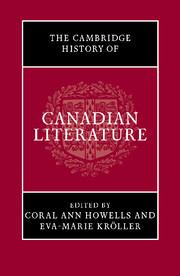Book contents
- Frontmatter
- Introduction
- PART ONE OLD AND NEW WORLD, LA NOUVELLE-FRANCE, THE CANADAS, DOMINION OF CANADA
- PART TWO THE POST-CONFEDERATION PERIOD
- PART THREE MODELS OF MODERNITY, POST-FIRST WORLD WAR
- PART FOUR AESTHETIC EXPERIMENTS, 1960 AND AFTER
- 18 Quartet: Atwood, Gallant, Munro, Shields
- 19 The short story
- 20 Canadian drama: performing communities
- 21 Poetry
- 22 Poetry, drama, and the postmodern novel
- 23 Comic art and bande dessinée: from the funnies to graphic novels
- 24 “Ghost stories”: fictions of history and myth
- 25 Indigenous writing: poetry and prose
- 26 Contemporary Aboriginal theater
- 27 Transcultural life-writing
- 28 Multiculturalism and globalization
- PART FIVE WRITING IN FRENCH
- Bibliography
- Index
- References
27 - Transcultural life-writing
from PART FOUR - AESTHETIC EXPERIMENTS, 1960 AND AFTER
Published online by Cambridge University Press: 28 September 2010
- Frontmatter
- Introduction
- PART ONE OLD AND NEW WORLD, LA NOUVELLE-FRANCE, THE CANADAS, DOMINION OF CANADA
- PART TWO THE POST-CONFEDERATION PERIOD
- PART THREE MODELS OF MODERNITY, POST-FIRST WORLD WAR
- PART FOUR AESTHETIC EXPERIMENTS, 1960 AND AFTER
- 18 Quartet: Atwood, Gallant, Munro, Shields
- 19 The short story
- 20 Canadian drama: performing communities
- 21 Poetry
- 22 Poetry, drama, and the postmodern novel
- 23 Comic art and bande dessinée: from the funnies to graphic novels
- 24 “Ghost stories”: fictions of history and myth
- 25 Indigenous writing: poetry and prose
- 26 Contemporary Aboriginal theater
- 27 Transcultural life-writing
- 28 Multiculturalism and globalization
- PART FIVE WRITING IN FRENCH
- Bibliography
- Index
- References
Summary
Since the 1980s, life-writing has become a recognized and productive genre, incorporating the traditional forms of autobiography, memoir, journal, and biography as well as adding sub-genres such as advice columns, letters to the editor, obituaries, video tapes, performance, and online lives. As such, life-writing has simultaneously developed into a privileged form of self-expression and into a major field of scholarship. More than representations of self, such texts represent their subjects in relation to their cultures, tracing their interactions over periods of time. In the course of the twentieth century, these subjects and cultures were primarily defined with reference to a nation and its official language. A seemingly homogeneous allegiance to a national code could, however, not be fully realized in classic immigration countries like Australia, Canada, and the United States. Waves of immigration since the end of the nineteenth century have challenged uniform national credos and transformed mainstream societies. The end to colonial rule in Third World countries and the appeal of free economic markets in the First World have created new patterns of global migration in the second half of the twentieth century.
With the transition from a modern to a postmodern age, the processes of acculturation changed from the demands of assimilation to the recognition of cultural differences. The long-held belief in a monocultural model of society gave way to the reality of multicultural nations. Canada is one of the few countries which has officially recognized her cultural heritage of immigrants by adding the Multiculturalism Act to her Constitution in 1988. Forms of life-writing which have appeared since then affirm the spirit of this legislation, though they often relate stories of discrimination of past and present in different cultures.
- Type
- Chapter
- Information
- The Cambridge History of Canadian Literature , pp. 536 - 555Publisher: Cambridge University PressPrint publication year: 2009



